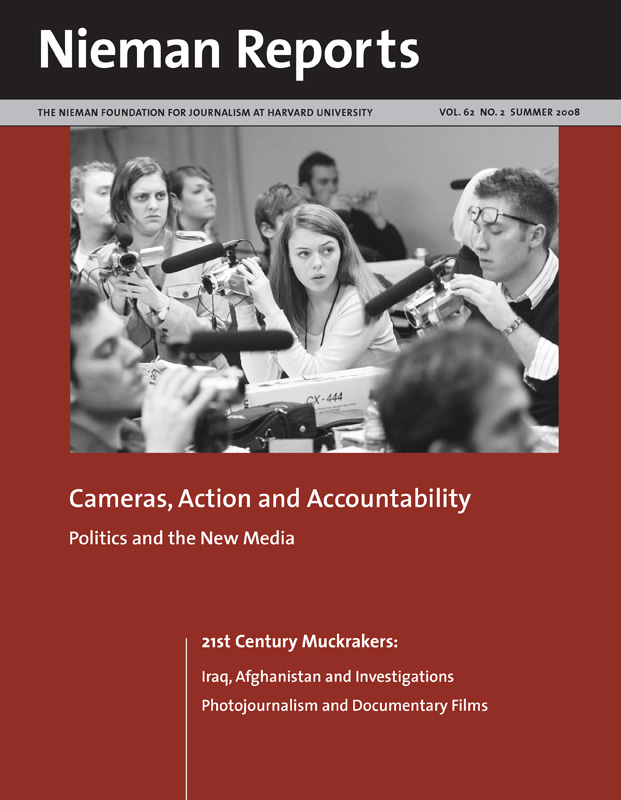Why are young people turning away from the mainstream media? And where are they going to get their political news and information?
To respond to the first question, I guess I’d have to say Jon Stewart is to blame. He is, after all, the voice of confidence for my generation, albeit a voice of humor and satire that doesn’t seem to trust the establishment. He criticizes everyone: the media, the politicians, and even his own show. It’s a style that resonates with a crowd that has long since given up on newspapers and network newscasts. But Stewart is not alone. The proliferation of the Internet and the rising popularity of digital video recording products like Tivo have created a culture of convenience. News is no longer bound to the morning paper or the evening news. It’s available when we want it to be.
Increasingly, we also view it on our terms.
Newspapers fail to interest us because newsprint is a limited format, not because of problems within the newsroom. The New York Times Web site is still one of the best online news sources, even if its print readers and profits are on the decline. It fills a niche for hard news — the “just the facts” approach — that is somewhat lacking in a generation of Daily Show-inspired bloggers and online journalists.
Speaking of blogs, they are popping up like corn in oil on a hot stove. And some blogs have gained credibility and even been transformed into something resembling an online “newspaper” — with a masthead and experimental assortments of different ways to bundle and distribute political news and opinion. Dailykos.com, which started out as a political blog written by Markos Moulitsas, has flourished into a community of “contributing editors” writing about politics. The Web site’s founder, along with fellow Internet news tycoon Arianna Huffington of The Huffington Post, have morphed into go-to talking heads for the mainstream media when they need credible, intelligent voices from this new breed of journalism.
Finding Community
For us, the key to Dailykos.com is how it is a community, a place where everyone has a voice. Here, readers interact with one another and with what they read. When they don’t like a story, they can let everyone know why, and then, perhaps, go out and write their own. Or they can post opinionated “diary” entries, and these find a home on the side streets of this online community. Some readers become full-time writers for the site.
This multidimensional web of connection doesn’t exist in the traditional media, though some mainstream news organizations try hard to emulate it. CNN’s YouTube debates, for example, let anyone submit a question to the candidates via video. And these days it is hard to find a mainstream news site that doesn’t let readers post comments on stories just as blogs do. But in most cases an editor or moderator has the last line of editorial control.
That gatekeeping role is viewed by many in my generation as a sign of elitism, and it doesn’t work for us. We enjoy our Internet camaraderie, and we use it. Even a social networking site like Facebook.com, which doesn’t claim to be anything more than a way to keep friends updated on your life, has a way of spreading political news and information. People share links with one another, comment on news stories, and join groups to show their political affiliations. (Not surprisingly, the group supporting Stephen Colbert for President became one of the largest groups in the history of the Web site.)
Other social sites like reddit.com or digg.com don’t create content, but simply post user-submitted links with headlines. Not all are news items, but many of them come from mainstream media and, for the past year or so, many of them are focused on the presidential race. Readers vote on stories posted to the site, pushing the ones they deem most important to the top. It’s a form of editorial oversight, yes, but it’s one done by the community’s consent.
With so many options available, most of my friends don’t rely on any one source to get their news. We can watch or read multiple takes on the same story — and then we can go back online any time to see the candidate’s actual speech or debate or press conference or even their unscripted moments on YouTube. These twisting paths are what eventually lead us to what we absorb as the truth. Sound bites and talking heads don’t measure up to watching and listening to the subject of the story.
This is unfortunate, because I’m a recent graduate with a degree in print journalism. I’ve never been taught how to maintain a blog or write multimedia online articles. I’d like to believe that the elements of journalism I’ve learned — objectivity, fairness and accuracy, to name a few — can be enough to help me get by. But the definition of the field is changing faster than it can be taught. Who knows where it will be in four years when the next presidential election cycle gets rolling? And it seems dubious right now that my peers will even pay attention to what I might then go out to report.
Already, my generation doesn’t trust what the lone anchor tells us, nor the pundit, nor the panel of experts. We figure that we can put the pieces of the story together for ourselves and then listen in as our friends — online and off — offer their interpretation of what’s going on. While our approach doesn’t bode well for the mainstream news industry, I’d argue that it brings us closer to our nation’s early ideals of journalism. Benjamin Franklin wrote in his “Apology for Printers,” “Printers are educated in the Belief that when Men differ in Opinion, both sides ought equally to have the Advantage of being heard by the public, and that when Truth and Error have fair Play, the former is always an overmatch for the latter.”
Franklin’s words are relevant today. Living, as we do, in a time when what he calls “truth and error” are constantly being blurred, it seems that for my generation it’s getting easier to tell the two apart.
Jonathan Seitz is a recent graduate at Boston University, where he majored in magazine journalism. He has written for Hot Press Magazine in Dublin, Ireland, and is an editorial intern with First Act Guitars in Boston.



